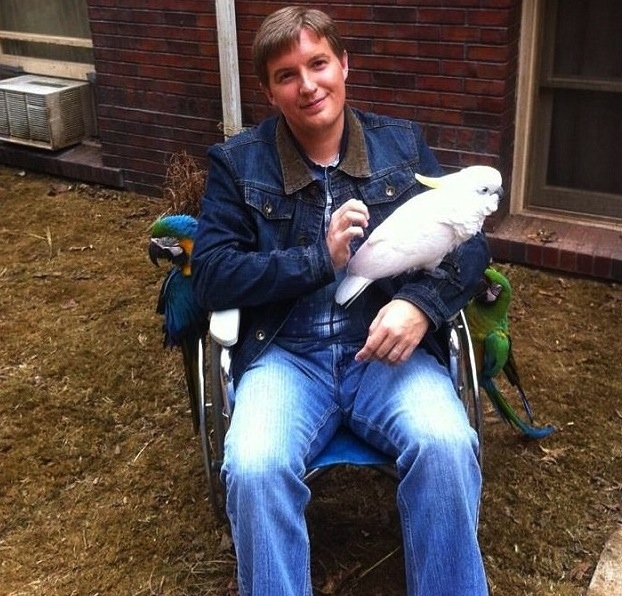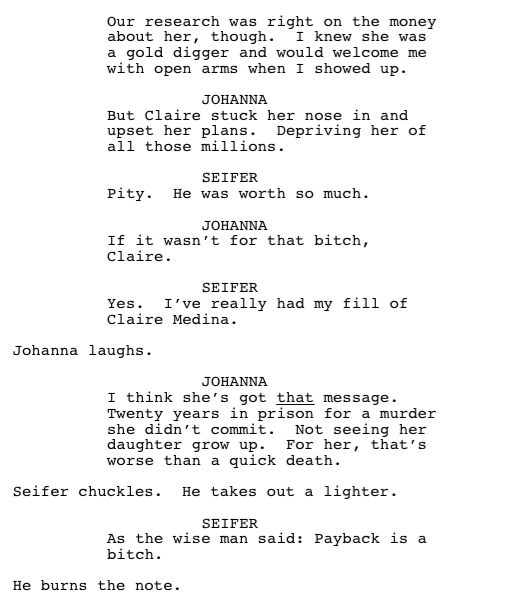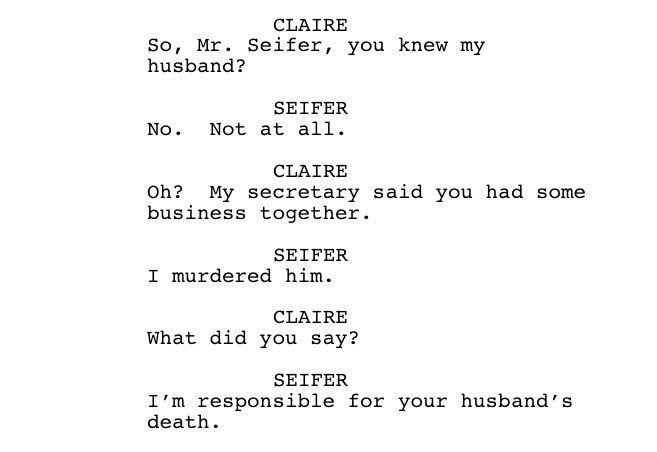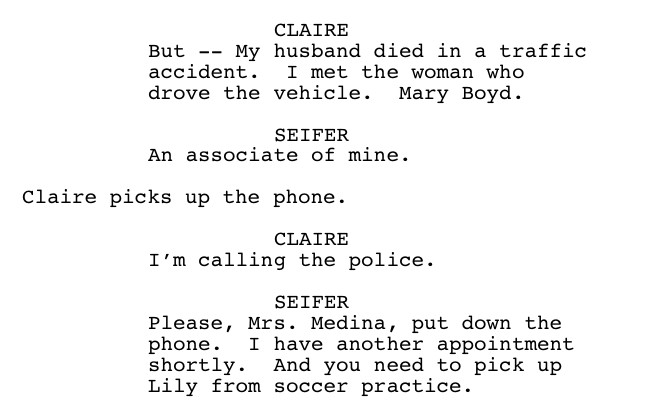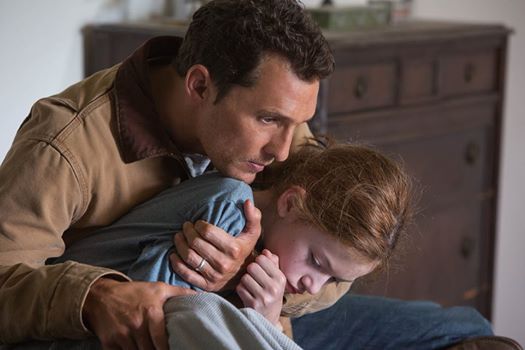Genre: Drama
Premise: An alcoholic who’s been told that his liver is about to give out must move in with the family he’s ignored his entire adult life.
About: “George” finished high up on the 2012 Black List. The writer, Jeff Shakoor, will get his first big-time TV writing credit when Netlfix premieres its show, “Bloodline,” about a rich family with some dark secrets. Shakoor wrote the second episode in the series. You can check out my review of that pilot here.
Writer: Jeff Shakoor
Details: 117 pages
Jon Favreau brought up a good point in that Hollywood Reporter Roundtable I linked to the other day. He said studios always want that likable main character driving the story. As you can imagine, the table bristled at the mention of the word “likable.” Ooh, that evil word. “Likable.”
Favreau pointed out that the very idea of a likable protagonist didn’t fit the hero journey template. In the hero’s journey, a character must have a flaw that they overcome over the course of the story. In most cases, that means starting in an “unlikable” place. The “likable” part only comes once the character transforms.
It’s an age-old problem. And while not every flaw must include an aspect of “likability” (your character’s flaw can be, for example, “not believing in one’s self,” a la Rocky), some of the more interesting flaws, such as selfishness, fall squarely in the path of the adjective.
What writers often forget, however, is the notion of balance. If you’re going to make your hero selfish, and therefore, “unlikable,” you need to establish an equity line of “likability” to balance it out. However, a lot of writers get so angry at the notion of Hollywood telling them they have to make their hero likable, they go in the opposite direction, making their character the embodiment of evil as a “fuck you” to the industry. That seems (to me at least) how we got our lead character in “George.”
60-something George’s alcoholism is so bad, that even when he’s told by his doctor that his liver will cease functioning and he’ll be dead in six months, George still wants a drink. It’s been this way for George’s entire adult life. All he cares about is his next beer, his next shot, his next bottle of Jack.
He figures he’ll spend his last days where he’s most comfortable. The bar. But there’s a problem with that. George is broke. He used to be able to get past that hiccup with his good looks and charm. But George is now in his 60s with that aging alcoholic’s face. Good looks and charm are no longer in his repetoire.
So George is forced to call his ex-wife, Myra, whom he, of course, asks for money. She tells him to fuck off. She’ll give him a place to stay until he dies. But the last thing she’s doing is giving him a stack of cash so he can end his life a couple months early.
Going back home means meeting his now-adult children for, really, the first time, since he was out drinking throughout their entire childhood. The idea is for George to foster some sort of late-life relationships with them, but George has never been the sentimental type. He’s not above asking his grandkids for money so he can secure his next drink.
Of course, George is pulled into his family members’ lives merely by being around (such as when he catches his teenage grandson partaking in a homosexual act) and while he’s far from helpful in these situations, he’ll offer guidance if it involves some level of amusement for himself. Will George finally change before he dies? Will he realize what truly matters in life? Only one way to find out.
I love the whole “unlikable” debate. I think it’s the most fascinating argument in screenwriting. Because Favreau is right. You have to start your hero in a negative place if you want to arc them to a positive place. Nobody arcs from positive to positive. And yet attempts to utilize unlikable characters almost always end in bad screenplays (you guys tend to see all the professional scripts where this works. I see the hundreds of amateur scripts where it doesn’t). It’s hard to root for anybody you hate.
I think there are two types of selfish. There’s fun selfish, a la Bill Murray’s character in “St. Vincent” (spraying water at the neighbors) And then there’s mean selfish, which can probably be equated to a character like Melvin Udall from “As Good As It Gets” (telling people their lives are miserable). Obviously, the “mean selfish” character is a lot harder to pull off. And I’m still not sure how they did it in “As Good As It Gets.”
But they tried it here, and I’m afraid it didn’t work. Shakoor doesn’t even try and build up any “likable equity” with George. George grabs the breasts of his nurses, telling them how hard he would’ve nailed them in his heyday, then goes to the bar, drinks 5 shots in a row, and laughs at the bartender when he tells him he can’t pay for them. It’s pretty brutal.
The first “nice” moment in “George” doesn’t come until page 50 or so, when he helps his grandson, Michael, go find a hooker to see if he’s gay or straight. That’s a long time to wait until the very first nice thing your character does.
I was re-watching Frozen the other day – one might say the “anti-George” – and I realized that if you establish a likability IMMEDIATELY with your characters, you can get away with a lot later on. We establish sisters Anna and Elsa lovingly playing with one another, then harshly broken apart, then pining for one another again, and it pretty much allows them to do whatever they want with Elsa , the Ice Queen” moving forward. We saw how sweet she was capable of being. We pine to see that sweetness again.
It would make sense then, that the opposite would hold true. If you make us dislike your character right away, that feeling is probably going to follow the character throughout the movie.
From a technical standpoint, “George” never quite resonated either. The script is jam-packed with dialogue, which is fine. But 90 percent of it is George insulting people. I’ve said this before. You need to add variety to your dialogue. We all have our patterns, the things we like to do with dialogue. But if you ONLY do that, you’ll tire the reader out. 50 insults in and we were only on page 20 – I needed more variety than that.
So why did this script end up on the Black List? Well, The Black List likes to celebrate scripts that take chances – particularly scripts with unabashedly dark characters (even better if they’re dying – another Black List favorite). Everything from St. Vincent to Cake to Bad Words to The Social Network. If you’ve got a meanie main character, this is where you’re hoping to showcase it.
So by no means am I telling you never to write an unlikable main character. There are plenty of anti-establishment Hollywood folks who will give you the thumbs up for giving them something different. Just keep in mind that it’s always a tough balancing act and if you don’t get it just right, people are going to dismiss it out of hand.
[ ] what the hell did I just read?
[x] wasn’t for me
[ ] worth the read
[ ] impressive
[ ] genius
What I learned: Pay very close attention to what you’re doing with your main character early. Every little thing they do is affecting how we see them. We don’t know this person yet, so their actions are very powerful. They don’t tip, we see them as cheap. They hold the door open for the person behind them, we see them as thoughtful. Your character’s actions are more powerful than you think. Use them wisely.
Genre: Comedy
Premise: Lloyd and Harry are back! When Harry finds out he has a grown daughter, he and Lloyd hop in their car and drive cross-country to find her.
About: The Farrelly Brothers have been trying to make this movie forever. Even Jeff Daniels has been pining for a sequel. But it wasn’t until Jim Carrey said yes five years ago that the sequel was given the go-ahead. Carrey had come across the first film during a hotel stay and couldn’t get over how much love was put into it. He had to revisit the character. Strangely enough, Warner Brothers, who owned the rights, wasn’t thrilled about the script. They thought it depended too heavily on the past. For example, they didn’t think anyone would know or care about Billy in 4c (“Pretty bird. Pretty bird. Polly wanna cracker?”). Warners was so not sold on the project that they actually dropped it. The Farrellys then took it to Universal, where it really paid off. The film finished number 1 with 38.5 million dollars this weekend at the box office. Peter Farrelly wants to do a third one to complete the trilogy. He wants to call it Dumb and Dumber For.
Writers: Sean Anders, Mike Cerrone, Bobby Farrelly, Peter Farrelly, John Morris, Bennett Yellin
Details: 110 minute running time
Look. Dumb and Dumber To was not as good as Dumb and Dumber. It wasn’t even close. And while that may seem like a contender for “most obvious statement of the year,” there’s a lot to be learned here from the disparity between the two.
You see, over time, I’ve changed my mind about what is the most important aspect of a screenplay. I used to think it was all about the story. Now, I think it’s about the characters. Because if you write compelling characters, the audience will follow them regardless of the story.
Take one of my favorite comedies of all time, Swingers. Swingers has no real story to speak of, and is one of the messier scripts you’re ever going to read. It’s about a guy getting over his girlfriend. No wait, it’s about two guys who go to Vegas. Or wait… now they’re coming back from Vegas. Now it’s about a group of friends bar-hopping. I mean Favreau really deserved a Razzie for the plotting of that story.
But it DIDN’T MATTER because you loved Mikey so much. You wished Trent was your best friend. You loved all those guys. The genius of that movie was that the characters were so strong, you didn’t care what they were actually doing.
Dumb and Dumber was similar. It, too, had a weird story structure. The road trip, which you figure is going to last the entire second act, actually ends around the midpoint, and the last half of the movie takes place in Aspen. But again, you didn’t care. Lloyd and Harry were hilarious so you hopped onto whatever dog and pony show they were offering and enjoyed the ride.
But see here’s where the character theory becomes flawed. Throughout history, we have seen sequel after sequel with our favorite characters, and those sequels have sucked. I mean Ripley (Aliens) is one of the coolest most badass characters ever. But I fucking hated Alien 3. And I hated that character in it.
I didn’t “hate” Dumb and Dumber To. But the magic was gone. Throughout its clunky opening, everything about Lloyd and Harry felt off. Their interactions weren’t as crisp. Their jokes weren’t as funny (“What’s your cat’s name?” “Butthole.” “Why did you name him that?” Harry shows Lloyd the cat’s butthole?). It was like, wait a minute. These characters have already been established as great characters who we love. So why am I not loving this?
This is where you really begin to appreciate the art of screenwriting. Because the reality is, there are no solos in a screenplay. There are a bunch of instruments and they all have to work together for the symphony to work. As important as character is, it cannot work unless you’re placing those characters into interesting situations that the audience cares about. And that was, partly at least, why Dumb and Dumber To failed. You didn’t care as much for the situations the characters were in.
For those who haven’t seen the movie, it’s been 20 years since we last saw Harry and Lloyd. It turns out poor Harry’s kidneys are failing and he needs a transplant. Luckily, Harry finds out that he fathered a daughter 20 years ago. Which means if he finds his daughter, maybe she’ll donate her kidney and Harry will live!
Our two morons learn that Harry’s daughter will be at a “TED” conference across the country, so naturally, they’re going to fit right in. (spoilers) Once there, Lloyd falls in love with Harry’s gorgeous daughter, that is until he realizes Harry’s daughter is actually HIS daughter! Which means who’s going to donate a kidney to Harry? Hmm, somehow I suspect it will all work out.
We’ve established that great characters work up and until the story no longer puts them in situations we care about. So how did that happen in Dumb and Dumber To?
Well, Dumb and Dumber To actually made one of the most obvious mistakes one can make in writing a comedy. It overcomplicated its plot. I will say this until I die. Comedy plots need to be SIMPLE! If you’re stopping every other scene to include exposition, that means you’re not making people laugh. Oh sure, there are ways to be funny when conveying exposition, but it’s never as funny as when you have those unimpeded scenes where all you have to worry about is being hilarious.
Remember when Harry and Lloyd encounter Sea Bass and his crew in the diner in the first film? That’s what I’m talking about. We already have the plot stuff worked out up to that point, so we can just have fun with the scene.
And the plotting really is night and day between these two films. In the first film: Mary Swanson “forgot” her suitcase and Harry and Lloyd needed to return it to her. That was the plot! Here, Harry is dying, which we have to establish. We have to establish that he has a daughter he never knew about. He has to track down the daughter’s mom, then find out where the daughter is. Then and only then can they go on their way.
Each film has a criminal subplot, but the sequel’s subplot requires way more setup. Why? Because the sequel’s subplot has nothing to do with the inciting incident. Which means you have to set up the inciting incident, then use even MORE exposition to set up the criminal subplot itself. Remember in Dumb and Dumber, Lloyd takes the suitcase that was supposed to be the payment to the criminals. So they chase him. See how the inciting incident and the subplot are connected? In the sequel, the inciting incident is Harry’s kidney. The criminal subplot, however, has something to do with a trophy wife trying to kill her husband, Harry’s daughter’s father. Which means, you guessed, EVEN MORE EXPLAINING.
Here’s why all this matters. In storytelling, the best stories just “are.” They don’t FEEL like stories because you’re so wrapped up in them. Call Dumb and Dumber a silly comedy, but it was brilliant in that it didn’t require much plot to set up, which allowed its characters to simply “be.”
Here in Dumb and Dumber To, there’s so much explaining that has to be done in the first act, we become impatient. We become AWARE that we’re watching a movie. We’re wondering why Harry and Lloyd are acting so strange. Why aren’t they just being their dumb fun selves? They’re not being their dumb fun selves because they’ve got a truckload of exposition to feed the audience before the story can begin.
And a clunky first act can really ruin a film, since it puts the audience in a sour mood. Ever try to tell a story to someone who’s in a bad mood? Look, the first act is always tricky because you have to set up a lot of stuff. And in period pieces or sci-fi films, there aren’t a whole lot of ways around that. But in comedy, there usually is. Comedies should feel as effortless as possible, and that’s only going to be the case if you keep the plotting simple so you don’t have to set up half-a-dozen major plot points.
Because the truth is, once Dumb and Dumber To hit its stride and wasn’t bogged down in exposition, flashes of the old Harry and Lloyd returned. The characters seemed much more at ease. They could just “be.” And while it wasn’t like watching the original film, it was close enough that you were having fun again.
I wish I were here bringing you better news. But you’ll probably want to wait until Itunes for this one.
[ ] wut thuh he’ll dud I jest wach?
[x] wuznt 4 me
[ ] werth thuh prys off addmishon
[ ] umpressive
[ ] jeeniyus
What I learned: Try to limit the exposition as much as possible in the first act of your comedy. If you find that no matter what you try, you still have too much, it may be because your plot is too complicated in the first place. Change or dial back the plot so that your first act, and by association the rest of your story, can breathe and just “be.”
Remember, the two goals here are to tell us your favorite script from the bunch, and to share your thoughts about the scripts so as to help the writers improve. Now get to it!
Title: The Peak of Fear
Genre: Horror
Logline: A documentary producer’s search for the cause of her father’s suicide leads her to a remote mountain weather station. A horrifying truth is revealed when she and her team are stranded by natural , and supernatural forces seeking revenge. Based on True Events.
Why You Should Read: As an adventure documentary filmmaker I’ve been in numerous places where I found myself saying – “This would be a great setting for a film”. A few years back I did a film on Mount Washington. More people have died there than on Everest. Having spent 3 nights up there in the desolate Weather Observatory, trapped by the elements, I can assure you that the place is a cosmic focal point of bad karma. “The Peak of Fear” is based on a true story which makes it even more terrifying. It’s full of “dramatic irony”, “flawed characters”, “mystery boxes” and “realistic dialogue”. Think “The Ring” meets “Cliffhanger” with a dash of “Mama”.
Title: Extradition
Genre: Action/Thriller
Logline: When a guilt-ridden husband tracks his wife’s killer to Cambodia, a non-extradition country, he must negotiate a strange land, its uncooperative police force and a ruthless gang to bring him to justice.
Why You Should Read: Ask any cop why they chose the profession, they’ll tell you the same thing – “to help people.” Ask us for the truth, and we’ll tell you about the first time we watched Martin Riggs, John McClane or Johnny Utah take down a bad guy. — Extradition is my humble attempt at inspiring the next generation of crime fighters, and was inspired by a conversation with a fugitive that detained on a traffic stop, only to have to release upon learning his warrant was non-extradition.
Title: CRYO
Genre: Sci-fi/Adventure.
Logline: The survivors of a horrific crash find shelter in an abandoned fortress only to discover a young woman who has been cryogenically frozen for a hundred years (A futuristic re-imagining of Sleep Beauty).
Why You Should Read: I’ve been writing for years and had some limited success by placing in competitions (like the semis of Nicholls etc) and had lots of feedback from query emails (for example I’ve had BenderSpink request to read my scripts two or three times) but I’ve never gotten any further than that. Perhaps my ideas/loglines are intriguing but the actual script and/or my style of writing doesn’t reel them in.
I feel like I’ve lost a lot of momentum recently and I just wanted to try a different approach. Cryo is a script of mine that I never really knew what to do with because it started out as an experiment. Most of my scripts have ended up in the 110 page range so I decided to write a script that would be a lean, mean 90 pages. A script readers dream.
As anyone will tell you writing a ‘dead on’ 90 page script is extremely easy to do, but extremely hard to get right. A producer once told me “A complete feature script that is dead on 90 pages either means the writer is a very talented or very inexperienced”.
I had initially envisioned Cryo as being the first part in an interconnected set of films which would re-imagine popular fairy tales in a sci-fi setting. Of course this was before every spec script started to sell itself as a ‘Marvel cinematic universe’ style starter.
A first for Scriptshadow. I thought it’d be helpful for you guys to see some real industry coverage (from William Morris Endeavor)!
Title: The Almighty Stud
Genre: Comedy
Logline: A flunking seminary student is chosen by God (and bestowed with a celestial superhero outfit) to seduce a reclusive female pop star and foil her plan to destroy the balance between the sexes.
Why You Should Read: The Almighty Stud was recently submitted to WME and the reader had very complimentary things to say, such as, “The biggest strength of The Almighty Stud is its great comedic timing along with an original storyline.” The screenplay was rated as GOOD and CONSIDER. I’ve attached the coverage in case you want to peruse it.
Coverage: WME Coverage Link
And finally, I mean, how am I going to pass up someone who includes a Scriptshadow rap in his “Why You Should Read?”
Title: JoePudder72’s Merry eMas
Genre: Comedy
Logline: The manager of a failing mall secretly conspires to holiday shop using his nemesis – the world’s biggest eRetailer, but when his mobile device is stolen, things get complicated (JINGLE ALL THE WAY meets FALLING DOWN).
Why You Should Read: I’m a writer from Vancouver BC, trying to get credit on a film that doesn’t include in its production contract “producer will provide pizza” with the amendment “two toppings only.” Sadly, I’ve signed a document with just such a clause.
My script would be natural to review on Friday November 28, better known as Black Friday (the warm up for cyber Monday). I think you should consider doing so, because I wrote you and the SS community a little poem.
REEVES RAP
He’s a screenplay talent scout,
His “Bada Bing!” is In-N-Out,
Got his own story currency –
Goals, stakes, mad urgency,
Plots that make him dance with glee,
Have reveals, twists, an amputee,
These things a scribe should learn to heed,
To avoid the dreaded – “what the Hell did I just read?”
And get a script that’s good to go,
Props from posters like Kay and Poe,
But you know your work is at its best,
If it gets the nod from Miss SS,
I tell ya dude this ain’t no scam,
Time to get with the PROGRAM,
As in – DISCIPLE Bitch!
Now I gotta kill this rhyme,
The end is now – it’s bullet time
Get Your Script Reviewed On Scriptshadow!: To submit your script for an Amateur Review, send in a PDF of your script, along with the title, genre, logline, and finally, something interesting about yourself and/or your script that you’d like us to post along with the script if reviewed. Use my submission address please: Carsonreeves3@gmail.com. Remember that your script will be posted. If you’re nervous about the effects of a bad review, feel free to use an alias name and/or title. It’s a good idea to resubmit every couple of weeks so your submission stays near the top.
Genre: Psychological Thriller
Premise (from writer): A young widow discovers her husband’s accidental death is the latest in a series of murders-for-profit reaching back more than a decade.
Why You Should Read (from writer): This is based on my published novel. In its review, Mystery Scene magazine described the book as “a story Hitchcock would have approved of.” Exactly what I was striving for.
Writer: John Joseph Moran
Details: 118 pages
 Christoph Waltz for Seifer? No-brainer.
Christoph Waltz for Seifer? No-brainer.
Scripts that start out fun always seem to have an advantage over ones that don’t. It takes more effort to get into those moody reads and even when you do, they never quite read as fast as the fun ones. I’m not saying you should never write a drama, of course. But in the competitive world of spec writing where every variable counts, picking up something that moves quickly sure makes things easier.
And that’s the experience I had with The Benefactor. Even at 117 pages, it never really slowed down. But why do I still have a case of the reluctants when thinking about it? Something about it feels… how do I put it? Light. There’s a level of sophistication missing, which left my suspension of disbelief in constant flux. The Benefactor destroyed the Amateur Offerings competition two Saturdays ago so I know a lot of you read it. Maybe, then, you can help me figure out why I felt this way.
When 35 year-old Claire Medina’s husband is hit and killed by a car, it’s bittersweet. On the one hand, he was her husband and father to her daughter. On the other, he was abusive and an altogether terrible person. As much as Claire hates to admit it, there’s a freeing feeling to her husband being out of her life. It’s almost too good to be true.
It turns out that’s exactly the case. A month later, Claire is approached by the sinister Nikolas Seifer, who informs her that he runs a unique business. He finds troubling individuals, individuals that spouses or family members wouldn’t mind dead, and he kills them in what looks to be an unfortunate “accident.” Afterwards, he approaches the spouse and asks for half of their fortune as payment for improving their lives.
Half Claire’s fortune is a lot of money. So Claire tries to find something on Seifer to use against him. But this guy is clever. He’s implicated Claire for the murder of her husband in several ways in case she doesn’t pay up.
Eventually, Claire realizes the best option is to give Seifer the cash and be done with it. So that’s what she does. But 18 months later (yes, you read that right – we have an 18 month time jump), Seifer appears again and tells Claire that to complete the loop, she has to kill someone for Seifer, his next mark.
Claire decides to turn the tables though, encouraging her mark, Fanning, to fake his death in order to take down Seifer. As her and Fanning wait for their plan to take shape, they fall for one another. But just as they believe they’ve cornered Seifer, he turns the tables back on them, and Claire finds herself fighting for her life, as she’s implicated for the murder of Fanning’s wife, a murder she didn’t commit.
This was a wild one. Lots of twists and turns here. The danger with a lot of twists and turns though, is that unless you’re extremely diligent, you’re bound to create some plot holes. There were a good half-a-dozen times here where I stopped and went, “Waaaait a minute. Couldn’t they just…?”
Like Seifer’s system. It’s a clever premise, don’t get me wrong. A hitman predicts that you want your spouse dead and therefore does it for you, only asking for the money afterwards so there’s no way for you to get caught. The catch is, he extorts you for the money.
But why only target “bad” people in this scheme? Since he’s extorting the people for money afterwards either way, can’t he technically do this to anyone, bad or good? What’s the advantage of only targeting bad people? I suppose it’s a little easier to deal with someone who kinda likes the fact that their asshole husband is dead. But nobody’s going to be thrilled when you demand half their fortune for the hit, whether they hated their hubby or not.
That’s what’s so frustrating about this script. It kept me reading all the way through. I wanted to find out what happened in the end. Yet it was littered with these lazy story pockets that weren’t believable for some reason or another. And again, it went back to a lack of sophistication. Let me show you a snippet of dialogue. Here, Seifer and his cohort, Johanna, are discussing how Fanning’s wife turned on Claire and their plan, allowing Seifer to gain the upper hand against them.
This is so over-the-top and on-the-nose, you can practically hear the sound of Seifer twirling his mustache, with Johanna “MUWHAHAHAING” in the background.
You may also notice the “explainy” nature of the dialogue (“Twenty years in prison for a murder she didn’t commit…”). There is a TON of this throughout the script. “Why can’t we go to the police?” “Because if Character A tells Character B we went to the police then it’ll mean we’re screwed. But if we follow Option C instead, then…”
Explainy dialogue almost always means the writer is using his characters to talk to the reader instead of his characters talking to each other. This is why this dialogue feels stilted and artificial, because it’s being directed at the wrong person. Dialogue must always, first and foremost, sound like two characters talking to each other. As soon as one of them stands up on their “explanation soapbox” to address the reader directly, you’ve pierced the reader’s suspension of disbelief.
And that problem was persistent throughout much of the screenplay. Too much of the dialogue felt “off” for one reason or another. Take this exchange early in the script. Four weeks after her husband’s death, Claire is sitting in her office when Seifer arrives. Here’s the exchange.
While I don’t think this is terrible dialogue, it rang false (to me, at least). If someone says to you, “I murdered your husband,” are you really going to respond with, “But – My husband died in a traffic accident. I met the woman who drove the vehicle. Mary Boyd.” Someone just told you they are a murderer and you’re responding with a conversational rebuttal?
I could see freaking out. I could see realizing you’re in danger and enacting some sort of stall tactic while you figure out what to do. At the very least, note Claire freezing when she hears these chilling words. But without clarification, it reads like the ho-hum response of someone who’s just been accused of leaving the iron on. It’s emblematic of issues I had with the dialogue throughout.
The other big problem here has to do with time. Remember that unless you’re doing a period piece, you want the time frame for you movie to be as contained as possible. Any big time jumps mean a loss of momentum. But they also mean a lack of planning. It’s indicative of a writer who hasn’t worked hard enough to keep his story moving in one continuous timeline.
I mean the 18 month time jump is nothing short of a momentum assassination. If there’s any way to eliminate it, I’d do it. And then there’s Claire going to jail and the subsequent courtroom trial, which is another huge time jump. You have yourself a thriller here. You don’t want to end up in a boring courtroom drama sequence. Case in point. Imagine if Silence of the Lambs ended in a courtroom case. Do you think it’d still be considered a classic?
As soon As Claire goes to jail, get her out on bond, and have her and Fanning find and confront Seifert. It makes no sense to have your main character sitting in jail while this Fanning character, who we met less than 30 pages ago, searches for our villain.
Speaking of Fanning, I thought for sure he was going to turn out bad. I thought the whole idea behind Seifer’s system was that he targeted evil people. With Claire disrupting the system, I believed the irony would be that she’d pay the price. Fanning would end up doing something horrible to her. But even if you don’t explore that avenue, it seemed weird that all these people Seifer had killed previously were terrible human beings, yet Fanning turned out to be a great guy.
Anyway, I think Moran deserves some props for coming up with a unique premise and an unpredictable story that moves from start to finish. But to get this up to “worth the read” territory or higher, he needs to shore up some of the dialogue issues. I mean this is a “Hitchcock-like” story and I don’t remember a single conversation that included dramatic irony. Watch Psycho and note how nearly every dialogue scene contains dramatic irony (one character is lying to another). Fix that and the excessive time jumps and The Benefactor is going to be the real deal.
Script link: The Benefactor
[ ] what the hell did I just read?
[x] wasn’t for me (just missed a ‘worth the read’)
[ ] worth the read
[ ] impressive
[ ] genius
What I learned: Beware of characters being too “explainy” (“Why can’t we go to the police?” “Because a) it means blah blah, b) that would entail blah blah blah, and c) the villain would blah blah us”). Either cut all this explaining out or look for other ways to convey the message. For example: “Why can’t we go to the police?” Claire pulls out a newspaper with the headline, “Man Found Dead in Car.” “This is the last guy who tried to go to the police.”
What is the second act? When does it begin? When does it end? I started asking myself these questions after watching this writers roundtable the other day (thank you, commenter who posted this). John Favreau brings up a great point about how the second act is a series of lessons for your main character, and that’s something I’ll get to later on. But just the topic of the second act in general intrigued me, because I think no matter how much you dissect it, the second act is still full of mysteries. It’s like this cave where, every time you think you’ve found the end, there’s another little tunnel that extends even deeper.
Before you can figure anything out about this elusive act, though, you have to know where it begins and where it ends. It begins when your character goes on his journey to pursue his goal. So for those of you who saw Interstellar, that would’ve been when Coop blasts off in his ship on his JOURNEY to find new planets that will save mankind.
The end of the second act is a little trickier to locate. A lot of people will say that it’s when your character is at his lowest point. But I don’t think that’s helpful. It doesn’t give you a concrete destination to take your character. A better definition is probably: when it APPEARS that your main character has FAILED at his goal. Now Interstellar had a whole lot of shit going on, so it’s not the easiest script to decipher when this happened, but I’d probably say the end of the second act is (spoiler) when Matt Damon nearly kills Coop. Either that or when Matt Damon destroys the orbiting ship. In The Hangover, it’d be when they think they’ve found Doug, only to realize it’s not “their” Doug. Time is up. There’s nowhere else to look. They’ve failed at their goal.
Preferably, this “start goal/finish goal” is how you’d approach all your second acts. But as we all know, not every story is this “clean.” Sometimes, the character goal will shift to something else in the middle of the movie (in Aliens, the goal is to go in there and kill the aliens. But when that goes bad, it becomes more about escaping). In other cases, the goal isn’t concrete (American Beauty). And in some movies, there isn’t a goal driving the story at all (When Harry Met Sally). Now I’m not saying that every screenplay has to be goal-oriented, but I will say that the further you move away from that model, the trickier the second act gets. And when you’re talking about something that’s tricky ANYWAY, you can see why so many scripts die here.
To be honest, I wish someone would write a book and just definitively declare the death of the 3-Act structure and make it 4 acts instead. That way you’d have 4 evenly divided sections, making it so much easier to get a handle on your story. In the 4-act scenario, the second act would be the “wind-up” act, where mysteries are being set up and the hero is getting a feel for just how bad the situation is. And the 3rd act would be when the shit really hits the fan. When the big-daddy obstacles are thrown at your hero and when success really starts to come into doubt. The 4th act would then be the rebirth, regroup and charge-in act. To me that’s a lot easier to get my head around.
But even if you have all that stuff in order, there are still certain things you gotta hit in the second act. Obstacles, for example. You want to throw things in the way of your hero so that nothing they do is easy. And remember, it’s hard to throw obstacles at your hero if they don’t have a goal they’re pursuing. Because if there’s no goal, then how do you place something in the way of that goal?
Now here’s where we get to what Favreau was talking about. As much focus is put on properly plotting the second act, the second act is really about character, and more specifically, TESTING YOUR HERO. Let me repeat that. The second act should put your hero through a SERIES OF TESTS. If you’re not testing your hero, you’re not developing your character. And the development of your character is the key to creating an emotional connection with the audience.
To achieve this, you first have to know what your main character’s flaw is. What is it that’s keeping them from being happy, keeping them from being “whole?” This is something your hero may not even be aware of. So for Gravity, Sandra Bullock’s character’s flaw was that she’d given up on life. She’d packed it in. This way, every obstacle that arrived onscreen wasn’t just an excuse to create a fun special effects shot. It was a test of her resolve. To see if she would fight to live or to give in. So the one-two punch of finding a flaw, and then repeatedly testing that flaw, is one that really packs an emotional wallop into the second act, and what builds the bridge for you to care so much in that final act, when the final test arrives.
In addition to this, the second act is about keeping things fresh. Most of the bad second acts I read – and I read a lot – make one critical mistake. They keep giving you the same thing. For example, I recently read a romantic comedy where the main character was pursuing a girl. The second act consisted of scene after scene of him trying to win over this girl. They were all the same scenes. Sure, the locations were different, but the make-up of each of these scenes was the same.
You solve this by BUILDING your second act. And to properly build, you need to do two things. Each major plot point must feel bigger than the previous one. And each major plot point must have HIGHER STAKES than the previous one. There will be some ebb and flow in the valleys between the major plot points. But the plot points themselves must feel bigger as they go on. Early in the second act of Star Wars, Luke and Obi-Wan need to find a pilot. The stakes are pretty high cause of this R2-D2 fellow. Later in the second act, they’re trying to escape from the Death Star with the Princess. A bigger plot point with higher stakes.
But just building isn’t enough. The second act is such a huge chasm of never-ending space that you have to surprise your audience every once in awhile, or else they get bored. You can do this with a surprising mid-point twist (in Gone Girl – spoiler – this is when we find out that Amy has been conning Nick), you can have your hero unexpectedly achieve his goal (he finds the killer!) only to announce a new goal soon after (it turns out they were after the wrong guy all along – the real killer’s still out there!). Or just throw in a fun surprise or three, something the audience isn’t expecting.
Keep in mind that it’s really hard to do any of this without a plan in place. And this is where you usually see the difference between amateurs and pros. Amateurs will try and wing the second act. They’ll try to come up with all these things on the fly, not realizing just how long the act is, usually resulting in them running out of steam (almost always around page 50).
Pros know that the second act is like a 100 day hike up the Pacific Coast Trail. If they don’t chart how much food and water they need, when they’re going to reach re-supply stations, or forget crucial tools they need to survive, they’re probably going to die. So as much as some of you hate to hear this, one of the biggest keys to surviving the second act is outlining. It’s a portion of the script that’s screaming out for a plan. And while I’m not saying you non-outliners can’t be one of the lucky ones who emerges at the finish line unscathed, it’s a lot more likely that you’ll die a drawn out agonizing death. ☺
I’d love to hear your own experiences with second acts and what helps you guys get through them. The more we can help each other out, the better we all get.



